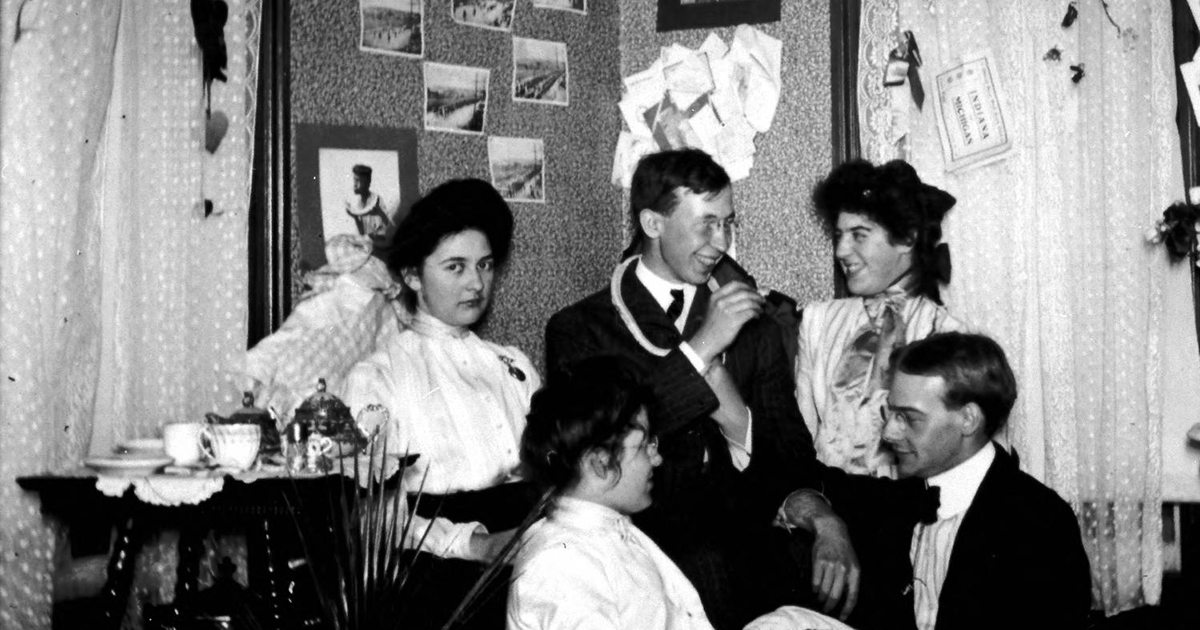Coeducational residency may seem par for the course at U-M today, but its history proves it was anything but simple.
When Madelon Stockwell entered U-M as the first female student in February 1870, there were no dormitories for men or women. Instead, students rented space in Ann Arbor residents’ homes or boarding houses. U-M’s earliest male and female students were as free to live together as their proprietors allowed, with no University oversight. Responses to a 1924 Alumnae Council survey, sent to the more than 10,000 women who had attended the University from the year 1870, demonstrate a range of reactions from women who lived in those rare coed houses:
Ethel Winifred Chase, 1903, MA1915: “For the three years I was on the Michigan campus, I was the only girl living in each of the several houses where I lived. … Never in those three years was I ever subjected to any personal annoyance or insult.”
Grace Ackerman, x’1917: “I rebuked the young man in the next room (men and women, I am sorry to say, were in the same house those days) for coming to ask a question in his bathrobe.”
As U-M’s female population grew on campus, administrators began to feel pressure to give them special attention. To that end, the University created the Office of the Dean of Women in 1896 (it added the Office of the Dean of Students in 1921, which took de facto oversight of the male student population).

The first dean of women, Eliza Mosher, MD1875, focused on physical education and health. In 1902, her successor, Myra Beach Jordan, 1893, took on housing and conduct. In addition to being a staunch supporter of women’s education, Jordan worked over her 20 years as dean to make in loco parentis—“in the place of a parent”—the law of the campus. Under her tenure, female students were eventually required to live in a University dormitory, sorority, or administration-approved boarding or rooming house—all of which were single-sex residences with strict curfews, conduct policies, and visitation hours for male guests.
That is not to say that the role of the dean was exclusively to impede student freedom on campus. The office helped lead the way in regulating safety and sanitation standards for off-campus housing and assisted in opening a number of women’s residence halls: Martha Cook (1915), Helen Newberry (1915), Betsy Barbour (1919), and Mosher-Jordan (1930).
But logistics and changing attitudes eroded the in loco parentis pursuit. Occasional student housing shortages saw temporary accommodations where women received space in men’s dorms, such as two halls of East Quad in 1952.

Over time, independent-minded students increasingly butted heads with Deborah Bacon—appointed the fifth dean of women in 1950—due to her self-professed “shield and buckler” views on upholding the established conduct and morality rules. In 1961, The Michigan Daily conducted an investigation that implicated her office in racially discriminatory and privately invasive practices, including reporting women’s dates to their parents. Bacon resigned in September 1961. The deans of women and men were consolidated into one office shortly afterward.
The framework of in loco parentis was dismantled over the course of the 1960s. Today, Barbour, Cook, and Newberry are the only all-women residence halls left on campus. Cook, among its other traditions, is the only one that still practices visitation hours.
Gregory Lucas-Myers, ’10, is assistant editor of Michigan Alumnus.





